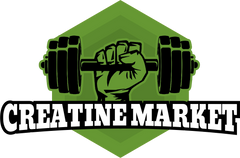The world of sports nutrition can be overwhelming, especially when it comes to supplements like creatine. Whether you're an athlete, fitness enthusiast, or someone looking to enhance their workout results, understanding how creatine interacts with your nutrition is crucial for maximizing its benefits.
In this comprehensive guide, we'll explore everything you need to know about creatine and nutrition, from natural food sources to optimal supplementation strategies.
What is Creatine and Why Does it Matter?
Creatine is a naturally occurring compound that plays a vital role in energy production within your muscles. Your body produces about 1-2 grams of creatine daily in the liver, kidneys, and pancreas. This organic compound helps supply energy to all cells in your body, particularly muscle cells, by increasing the formation of adenosine triphosphate (ATP) – your body's primary energy currency.
Foods Naturally Rich in Creatine
While supplementation is popular, several foods contain natural creatine. Understanding these sources can help you optimize your intake through diet alone or in combination with supplements.
Red meat is the richest natural source of creatine, with beef containing approximately 5 grams per kilogram.
Here's a breakdown of common food sources:
- Beef (5g per kg)
- Wild game (4.5g per kg)
- Pork (5g per kg)
- Fish (particularly herring, salmon, and tuna) (4-4.5g per kg)
- Organ meats (3-4.5g per kg)
However, it's important to note that cooking can degrade some of the creatine content, and you'd need to consume large quantities of these foods that naturally contain creatine in them to match the amounts typically recommended in supplementation protocols.
Should You Take Creatine on an Empty Stomach?
This question has sparked considerable debate in the fitness community. While creatine can be taken on an empty stomach, research suggests that its absorption might be optimized when taken with other nutrients.
When you consume creatine with carbohydrates, insulin levels increase, which can enhance creatine uptake by your muscles. Studies have shown that taking creatine with a combination of carbohydrates and protein can increase its retention by up to 25%.
However, if you prefer taking creatine supplements on an empty stomach, you won't significantly compromise creatine's benefits. The most important factor is consistency in your supplementation routine.
What Drinks Go Well With Creatine?
Choosing the right beverage to mix with your creatine can impact both its effectiveness and your enjoyment of the supplement. Warm or room temperature water proves most effective for dissolution, contrary to common beliefs about cold water being optimal. The warmer temperature helps the creatine molecules dissolve more completely, ensuring better mixing and absorption.
Fruit juice serves as another excellent mixer choice, with apple, grape, and orange juice being particularly effective options. The natural sugars in these juices can help with creatine uptake due to the insulin response. Additionally, sports drinks containing carbohydrates and electrolytes can enhance creatine absorption while providing additional benefits for hydration and energy.
However, it's important to note that caffeine-containing beverages should be avoided when taking creatine. Some research suggests caffeine might interfere with creatine absorption when consumed simultaneously, so it's best to separate your coffee or energy drink consumption from your creatine supplementation by a few hours.
Combining Creatine with Protein
The synergy between creatine and protein supplementation can enhance your training results. Research suggests taking creatine with protein and carbohydrates post-workout can maximize muscle uptake. This combination enhances muscle protein synthesis, improves recovery, increases muscle glycogen replenishment, and optimizes creatine storage in muscles.
For practical implementation, consider adding 5g of creatine to your post-workout protein shake. This simple strategy ensures you're getting both supplements at an optimal time for muscle recovery and growth. The timing proves particularly beneficial as your muscles are most receptive to nutrients from creatine and protein during the post-workout window.
Vegan and Vegetarian-Friendly Creatine Options
Since natural creatine sources are primarily animal-based, vegans and vegetarians need to pay special attention to their creatine intake. Vegetarians and vegans typically have lower muscle creatine stores than omnivores, making supplementation particularly beneficial for these groups. Research shows that vegetarians who supplement with creatine often experience more pronounced benefits than meat-eaters.
While there aren't direct plant-based sources of creatine, synthetic creatine supplements offer an excellent solution, as most are vegan-friendly. Additionally, focusing on consuming complete protein sources can support your body's natural creatine production. Many athletes find success combining creatine with plant-based protein powders to optimize their supplementation routine.
Optimizing Your Creatine Supplementation
Understanding the different approaches to creatine supplementation can help you choose the most suitable method for your needs. The traditional loading phase protocol involves taking 20g daily, divided into four doses, for 5-7 days, followed by a maintenance dose of 3-5g daily. Alternatively, the gradual protocol simply consists of taking 3-5g daily from the start, achieving saturation over 3-4 weeks. Both approaches prove effective, though the loading phase achieves saturation more quickly.
While timing isn't crucial for creatine supplementation, certain patterns may optimize results. Taking creatine post-workout with protein and carbohydrates can enhance absorption. On non-training days, morning supplementation works well. The key factor remains consistency - choosing a time that works with your schedule and sticking to it delivers the best results.
Common Mistakes to Avoid
Several common mistakes can reduce the effectiveness of creatine supplementation. Inconsistent supplementation ranks as perhaps the most significant error, as maintaining steady creatine levels in your muscles provides the greatest benefit. Mixing creatine with acidic beverages can decrease its stability and effectiveness, while taking too much at once may lead to digestive discomfort.
Inadequate hydration presents another common issue. Creatine draws water into your muscles, so increasing your water intake during supplementation becomes essential. Additionally, choosing low-quality supplements might expose you to impurities or less effective forms of creatine. Always select products from reputable manufacturers with third-party testing.
The Bottom Line
Creatine stands as one of the most well-researched and effective supplements available. By understanding how to optimize its intake through proper nutrition timing, food combinations, and supplementation strategies, you can maximize its benefits for your fitness goals.
Consistency remains the most crucial factor in creatine supplementation. Choose a supplementation strategy that aligns with your lifestyle and dietary preferences, and maintain it for optimal results. Whether you opt for the loading protocol or gradual approach, pair it with protein or take it solo, the key lies in regular, sustained use combined with proper nutrition and training.
For vegetarians and vegans, paying special attention to supplementation becomes particularly important given the lack of dietary sources. Regular supplementation can help bridge this nutritional gap and support athletic performance.
Remember that while optimizing your creatine intake through proper timing and combinations can enhance its effects, even basic supplementation will provide benefits as long as you maintain consistency. Start with the fundamentals of regular intake and proper hydration, then fine-tune the details of timing and combinations as you establish your routine.



